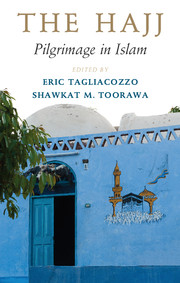Book contents
- Frontmatter
- Contents
- List of Maps, Charts, and Figures
- List of contributors
- Preface
- List of abbreviations
- Note on Dates and Transliteration
- Introduction
- PART ONE EVOLUTION
- PART TWO JOURNEY
- PART THREE INFRASTRUCTURE
- PART FOUR PERFORMANCE
- 11 Performing the Pilgrimage
- 12 Decoding the Hajj in Cyberspace
- 13 The Pilgrim's Complaint: Recent Accounts of the Hajj
- 14 Visualizing the Hajj: Representations of a Changing Sacred Landscape Past and Present
- Glossary
- Works Cited
- Videography
- Index
- Plate Section
11 - Performing the Pilgrimage
from PART FOUR - PERFORMANCE
Published online by Cambridge University Press: 05 November 2015
- Frontmatter
- Contents
- List of Maps, Charts, and Figures
- List of contributors
- Preface
- List of abbreviations
- Note on Dates and Transliteration
- Introduction
- PART ONE EVOLUTION
- PART TWO JOURNEY
- PART THREE INFRASTRUCTURE
- PART FOUR PERFORMANCE
- 11 Performing the Pilgrimage
- 12 Decoding the Hajj in Cyberspace
- 13 The Pilgrim's Complaint: Recent Accounts of the Hajj
- 14 Visualizing the Hajj: Representations of a Changing Sacred Landscape Past and Present
- Glossary
- Works Cited
- Videography
- Index
- Plate Section
Summary
INTRODUCTION
Performing the pilgrimage, circumstances permitting, is one of the so-called pillars of Islam, acts required of all Muslims. As the following canonical hadith illustrates, it has a very special status:
God's Emissary was asked, “What is the best deed?” “To believe in God,” he replied, “and in His Emissary.”
The questioner then asked, “What is next best?”
“To struggle in God's cause.”
The questioner again asked, “And what is next?”
“To perform an accepted/blessed pilgrimage,” he replied.
The significance of the pilgrimage being accepted/blessed (ḥajj mabrūr) is echoed in a standard Hajj supplication, “God, bless/accept my pilgrimage, forgive my sins, and reward my efforts.” And the prophet Muhammad is reported to have said, “One ʿUmra after another is an expiation for what comes between them, and there is no reward but Paradise for an accepted Hajj.” Even the ʿUmra, the non-obligatory, so-called minor pilgrimage, has considerable value. The reward is nothing short of Paradise. No surprise then that pilgrimage to Mecca and its precincts continues to be one of the most prestigious activities in which a Muslim can engage.
Pilgrimage to Mecca, whether the Hajj or the ʿUmra, is transformative. Even for the (probably small) percentage of pilgrims who regard the Hajj as nothing more than an obligation, and who remain spiritually unmoved by it, it is still a ritually exacting, physically demanding, and avowedly communal experience, like little else in a person's life. I can attest to this personally: I have performed the Hajj three times. I went on my first Hajj from France in 1972 at the age of nine, in the company of my parents and most of my immediate paternal relatives. Because I had not yet reached puberty in 1972, that Hajj did not discharge my obligation, did not “count” as it were, so I went again from Mauritius in 1994 at the age of thirty, with friends of the family and acquaintances. My most recent Hajj was in 2008. My wife and our two daughters (then aged eleven and fourteen) and myself, as their designated male travel companion (maḥram), set out from the United States.
- Type
- Chapter
- Information
- The HajjPilgrimage in Islam, pp. 215 - 230Publisher: Cambridge University PressPrint publication year: 2015
- 1
- Cited by



